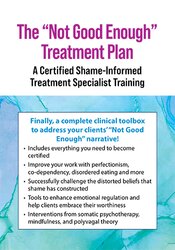
×

No matter what you treat, shame lies at the core of the chronic “not enoughness” that’s common in so many of your clients.
It’s the voice in their heads telling them that they are flawed, damaged, broken and fundamentally unworthy of love.
A voice that was often born in their childhood -- telling them to settle for mediocre relationships, reminding them of all their failures and convincing them to self-sabotage themselves again and again.
You want so badly for them to see they ARE ENOUGH.
But in therapy, shame is a barrier that blocks you at every turn -- making establishing trust and getting clients to open up feel impossible. The wounds run deep, their guard is up, and they question whether they even deserve help and understanding.
Now in this 2-day training you can become a Certified Shame-Informed Treatment Professional and equip yourself with the skills and tools you need to dismantle the roots of shame and guide your clients toward a more authentic narrative—one where they can see their true value and that they are enough.
Led by the expert, Dr. Patti Ashley—psychotherapist, international speaker, and bestselling author of Shame-Informed Therapy — you’ll discover how to incorporate elements of somatic psychotherapy, mindfulness, polyvagal theory, positive psychology, expressive interventions, and more so you can:
Don’t let the grip of shame continue to hold your clients back from the fulfilling lives they deserve.
Together, we’ll break down the barriers of chronic “not-enoughness” and empower your clients to rebuild their narratives with self-love, compassion, and authentic worthiness.
Register now!
CERTIFICATION MADE SIMPLE!
Attendees will receive documentation of CSTS designation from Evergreen Certifications 4 to 6 weeks following the program.
*Professional standards apply. Visit www.evergreencertifications.com/csts for professional requirements.
All members of the PESI, Inc. planning committee have provided disclosures of financial relationships with ineligible organizations and any relevant non-financial relationships prior to planning content for this activity. None of the committee members had relevant financial relationships with ineligible companies or other potentially biasing relationships to disclose to learners. For speaker disclosures, please see the faculty biography.
Continuing education credit information is coming soon for this live webcast.
| File type | File name | Number of pages | |
|---|---|---|---|
| Manual - The “Not Good Enough” Treatment Plan (12.94 MB) | 85 Pages | Available after Purchase | |
| Extra Handouts (0.47 MB) | 17 Pages | Available after Purchase |

Patti Ashley, PhD, LPC, is a psychotherapist, international speaker and best-selling author of Shame-Informed Therapy: Treatment Strategies to Overcome Core Shame and Reconstruct the Authentic Self (PESI Publishing, 2020).
With over 20 years of experience as a licensed counselor, Dr. Ashley brings unique insights into the identification and treatment of trauma, shame, grief and dysfunctional family patterns. She has counseled individuals, couples, families and groups in mental health agencies, psychiatric hospitals, and private practice settings. She currently maintains a private practice in Colorado where her Authenticity Architecture model helps clients break through unconscious barriers and rediscover a sense of self-love, belong, and connection.
In addition to her book for psychotherapists, Dr. Ashley is the author of Living in the Shadow of the Too-Good Mother Archetype (Wyatt-MacKenzie Publishing, 2014) and Letters to Freedom (Wyatt-MacKenzie Publishing, 2019). In addition to her clinical work, Dr. Ashley develops and teaches continuing education courses for psychotherapists, physicians, hospital wellness programs, universities, and several private organizations.
Speaker Disclosures:
Financial: Dr. Patti Ashley has an employment relationship with Authenticity Architects. She receives royalties as a published author. Dr. Ashley receives a speaking honorarium, recording, and book royalties from PESI, Inc. She has no relevant financial relationships with ineligible organizations.
Non-financial: Dr. Patti Ashley has no relevant non-financial relationships.
For live CE credit, you must watch the live webcast in its entirety at its scheduled time and complete the CE quiz and evaluation within one week. You will have access for 90 days after the program for review.
Please note: Each day there will be a 70-minute lunch and two 15-minute breaks; one in the morning and one in the afternoon. Lunch and break times will be announced by the speaker and at their discretion. A more detailed schedule is available upon request.
Visit our FAQ page at https://www.pesicanada.ca/faq or contact us at https://www.pesicanada.ca/contact-us.
The Neurobiology of Attachment and Self-Worth
Shame through the Lens of Polyvagal Theory
Create a Safe Therapeutic Environment to Process Shame
Identify Core Shame and Feelings of “Never Good Enough”
Empathy as a Catalyst in The Therapy Room: The First Step in the Journey from Shame to Self-Worth
Strategies to Build Clients Emotional Literacy and Agency
Family Systems, Authenticity and Somatic Embodiment: Writing a New Narrative of Self-Love and Compassion
The Shame Treatment Toolbox: Attacking “Not Enough” with Somatic, Mindfulness, and Complementary Approaches
Evidence, Research Limitations, and Treatment Risks
Compassion Fatigue and Self-Care
Satisfaction Guarantee
Your satisfaction is our goal and our guarantee. Concerns should be addressed to info@pesicanada.com.
Please wait ...